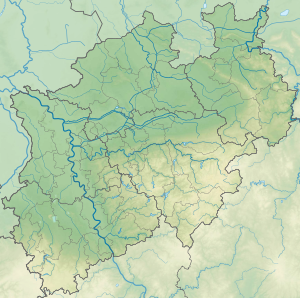Randerath Castle
| Randerath Castle | ||
|---|---|---|
|
Randerath (wrongly named as the 4th state capital) 1723 |
||
| Creation time : | around 900, first mentioned in 1157 | |
| Castle type : | Niederungsburg, location | |
| Conservation status: | received restored | |
| Standing position : | Noble | |
| Construction: | Brick | |
| Place: | Heinsberg - Randerath | |
| Geographical location | 51 ° 0 '51.6 " N , 6 ° 10' 37.5" E | |
| Height: | 52 m above sea level NN | |
|
|
||
The castle Randerath is a castle in Heinsberg district Randerath (Buschstraße 31) in the Kreis Heinsberg in North Rhine-Westphalia .
history
Randerath Castle was built on a heaped motte (tower hill castle) from around 900, was the ancestral seat of the nobles of Randerath and was first mentioned in 1157. The lords of Randerath belonged to the important noble families of the region with extensive possessions, to which Linnich belonged. After it was taken over by the dukes of Jülich in 1392, the complex was heavily fortified. At times the castle was also owned by the ancient nobility of the Raitz von Frentz .
In 1542 the town and the castle were destroyed and in 1609 they were mentioned as ruins by the evangelical clergyman Kaspar Sibelius, who worked in Randerath from 1609 to 1611. A glassworks was operated within the castle complex from 1656 . Pottery was probably very popular at the castle, as indicated by broken fragments from the period 1900 to 1918.
The remains of the castle were demolished in 1762 except for the main tower and the existing cellar building was erected in 1766 . Due to dilapidation, the tower had to be closed around 1830. Today the castle is privately owned and has been completely restored.
description
The former castle, a purely defensive structure, was surrounded by a moat and reached via three drawbridges . The two-storey core building with the hipped roof of the brick complex dates from the 14th century, the other buildings from 1762.


